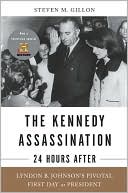

 |

|

The average rating for The Kennedy Assassination--24 Hours After: Lyndon B. Johnson's Pivotal First Day as President based on 2 reviews is 3.5 stars.
Review # 1 was written on 2021-02-13 00:00:00 Pete Taylor Pete TaylorBy the fall of 1963, Vice President Lyndon B. Johnson was a largely forgotten man in his own country. An article in the Texas Observer, "What is an LBJ?", reported that comedians and newspapers were having "a field day" with Johnson's obscurity. However, it all changed sooner than anyone could have anticipated: on November 22, riding in the fourth car behind the Kennedys' at the intersection of Houston and Elm Streets in downtown Dallas, Johnson heard explosions and was forced to the floor as a Secret Service agent shouted, "My God! They've shot the President." Although it can't be determined exactly when LBJ learnt he had been catapulted from profound obscurity to the post of U.S President, it was around 1 p.m, after he and Lady Bird were hustled through the emergency entrance of Parkland Hospital, when the head of Kennedy's service detail informed Johnson that the President was dead. The horrible news sent the world into a state of grief and anguish. ". . . The people of the world grieved as if they had terribly lost their own leader, friend, brother," wrote a White House aide later. That's why LBJ's main goal in his first twenty four hours as President was to comfort a shocked and grieving nation and thus reassure the American people that their government was still functioning. Although Johnson's ambivalent feelings toward JFK and his associates did shape his actions un the immediate aftermath of the assassination - his and RFK's mutual animosity, for example, was notorious - his performance during the first hours and days was excellent, mainly due to his masterful handling of the media. He insisted on immediately taking the oath and allowed a photographer to record the swearing in on Kennedy's plane, Air Force One. LBJ's rush to take command offended JFK's associates, but in his book Steven M. Gillon is sympathetic to the new president, explaining that this rush came from the desire to calm a frantic people, not to grab the prerequisites of office, and that actually the Secret Service forced a reluctant Johnson to use Air Force One, which in their eyes had stopped to be Kennedy's plane the moment it became known for sure that Kennedy was dead. LBJ's constant need to have approval and esteem was the other reason for his insistence on immediate swearing-in ceremony and on the backing of the Kennedy family. This fact explains his considerable insensitivity toward Robert Kennedy - he called the late President's grieving brother to ask him for legal advice on the taking of presidential power - and toward Mrs. Jacqueline Kennedy - he insisted that Jackie stand next to him at the swearing-in ceremony. These rather tactless acts aside, Johnson spent the first days of his presidency emphasizing the theme of continuity. Despite being seen as an usurper, an unelected and untested replacement for a beloved leader, he tried his best to reassure people at home and abroad that the new President would be faithful to the Kennedy administration. While the genuineness of his statements is questionable (unlike JFK, he remained a Cold Warrior; he didn't end the war in Vietnam as JFK had planned to do after his reelection; he didn't try to negotiate with Cuba, although Fidel Castro made it clear that he was as ready to make peace with the LBJ administration as he was with the JFK; and so on), he "wasted little time turning JFK's death into a rallying cry to pass the slain leader's legislative agenda." He assumed personal control over the fight to pass Kennedy's civil rights bill, and the one he managed to push through Congress was stronger then the initial one. This achievement, together with his unconditional war on poverty in America and aid for urban development, mass transit, and slum clearance, bore his personal brand - just as he dreamt - and helped him expand federal power to an extent unseen since the early days of FDR's New Deal. THE KENNEDY ASSASSINATION ' 24 HOURS AFTER is an interesting and insightful analysis of Lyndon Baines Johnson's decision-making process in the immediate aftermath of Kennedy's assassination. Steven M. Gillon's style makes the book easily graspable and compelling, and keeps the suspense fresh. What I enjoyed the most was the looking-over-LBJ's-shoulder approach to the story. Recommendable. |
Review # 2 was written on 2011-07-23 00:00:00 Anton Siluianov Anton SiluianovGillion attempts to reconstruct the 24 hours after the Kennedy assassination, sorting through the bickering Kennedy-Johnson cliques and their self-serving versions of every single event, including literally fighting over the coffin and in the confusion, misplacing the poor guy with the nuclear football three time between Dallas and a return to the White House. How Lyndon didn't just punch Bobby right in the mouth is a mystery for the ages. |
CAN'T FIND WHAT YOU'RE LOOKING FOR? CLICK HERE!!!